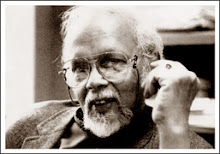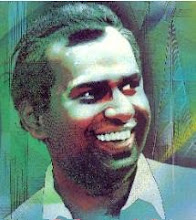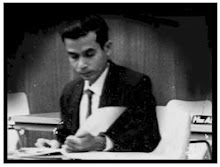|
|
Rajitha Dissanayake’s drama “No Return” is, perhaps, one of the best original drams produced and a stunning success in contemporary Sinhala theatre which analyses the decadence of the establishment in its manifold aspects.
Though the action takes place primarily in a Media Centre which issues press releases for the consumption of the public and in Ajith’s house, each and every character truly represents diverse strata of the society which is in a state of decadence with absolutely no sense of direction.
The society Ranjith depicts may be in Sri Lanka or in any other country is one which is increasingly collapsing and is on the fast track to absolute dictatorship.
The dictator or the leader operates through Ministers and the Minister operates through his begotten officials. The country is in the grip of a protracted struggle and as the struggle intensifies, it becomes necessary for the Ministry of Media to cover up the adverse reports emanating from the theatre of war as well as from political fronts.
Therefore, special media centre is set up at the Ministry of Media to issue press releases containing the government stance on the current situation. It is apparent from the very first scene that the primary task of the Media Centre is to launch a disinformation campaign to eye wash the public of grim realities.
Though most of the employees work willingly with the project, Ajith could not work against his conscience and puts up a brave resistance only to be a celebrated victim of the system. Towards the end, the dramatist lays the hopes and aspiration of a civilized order in Ajith who even lost his employment because of his principles.
One of the salient characteristics of the play is its universal applicability. The decadence of establishment portrayed in the play can be of Afghanistan, Pakistan or Sri Lanka. The society is corrupted to the core and top echelons of the administration are occupied by charlatans who pose off as efficient and patriotic officers. However, it is clear that their prime motive is nothing but money by any means.
“If some person is a nobleman in this country, then he is a rogue. If he is not, either his father or grand father was a rogue. There are very few noblemen who reached to that level without falling into these categories.
However, since we do not have such persons in our ancestry, I thought of starting it myself. I am not afraid to reveal them. I can purchase ships. If I want to buy them, I buy them myself in my name not in someone else’s name.
“-Samaranayake, the secretary of the Media Centre states in a soliloquy.
Samaranayake’s key lines epitomises the general attitude of the bureaucracy who are keen on exploiting the racial sentiments to earn quick money.
The dominant political discourse is in favour of the war and engineered patriotism which will cover up the sins committed by top bras of the army and the crafty politicians while the ordinary citizens and soldiers facing the brunt of the war directly and indirectly.
Samaranayake represents the stinking bureaucracy which is corrupted to the core and which feeds on the misery as vultures on the decomposed carcasses.
However, Ajith the idealistic character which perhaps, is the mouthpiece of the dramatist reveals the harsh reality of war and its repercussions on society.
“Friend, we still cannot understand the difficulties of war although we speak a lot about it. Besides how many become destitute while few become rich “-Ajith
“We stated in the press release that those who are speaking about the destruction caused by war, at the moment, are the forces that support the enemy. Ajith, you are also expressing the sentiments of the enemy, “- Sudath.
It is now clear beyond doubt that those who are opposing the war will, eventually, be labelled as “traitors to the nation” and thus silences the dissent not only against war but also against corruption and malpractices in the society.
“Preparing a country for a war is not an easy task even in the king’s reign. Besides, terrorising those who are against war is also not an easy task. I did both. When criticisms were there to the effect there is no development projects in the offing, I gave publicity to useless projects as best development projects in the world. Now they say that I submitted wrong reports. ....I am not a person who looks back until I destroyed the person who tried to attack me “- Samaranayake.
This is the order where no one’s position is secured. Each and every officer is in a perpetual struggle of survival and their fate is, by and largely, determined by the rumour-mongers who make up the inner circle or the kitchen cabinet of the leader.
As the leader could no longer mingle with the people and has now become a prisoner of the inner circle, implicitly believing the information provided by them. It is through them that he perceives the world outside his confinement.
“No Return “also excels in dramatization and sheer organisation of scenes that bring character to life. The best indicator of the drama’s contemporaneous and its timeliness is the audience’s interactive response.
Through out the drama, audience reacted to the witty remarks of the characters in general and Characters of Samaranayake and Ajith, the two characters that represented the opposite end of the spectrum.
Ajith being an idealistic person who has come down from USA with a genuine interest to serve the nation, eventually becomes a victim of the system and Samaranayake, the secretary of the Special Media Centre who is a product of the system, represents the corrupt bureaucracy.
Everyone in the society are in one way or other caught up in the scheme thrust upon them by demagogues who enjoy the fruits of the misery. It is only the leaders and corrupt officials who are profited by the raging war. “No Return” is a rare production in contemporary Sinhala theatre which the theatre goers should not miss.
************
On focused characters
 W.Jayasiri |  Bimal Jayakody |  Saumya Liyanage |
The Characters of Ajith (brilliantly portrayed by Saumya Liyanage) is perhaps, the pivotal character which represents the ideal. Though it is an ideal character, Ajith represents hope and aspiration for a just order and a society where people are recognized by their talents rather than on the basis of affiliations.
Samaranayake (W.Jayasiri) represents the corrupt bureaucracy and represents the so did -realities of the system. He is hell-bent on preserving the order and is also profited by it though he becomes a victim of it towards the end.His delivery of dialogue is remarkable and is marked for, perhaps, the natural acting.
Office Assistant (Bimal Jayakody) is also an important character which represents another aspect of the system. He is true to the character and least, one could say about him is that he portrayed the political agent or the spy in the office. His portrayal is also natural and seems that he had done his home work well.





































No comments:
Post a Comment